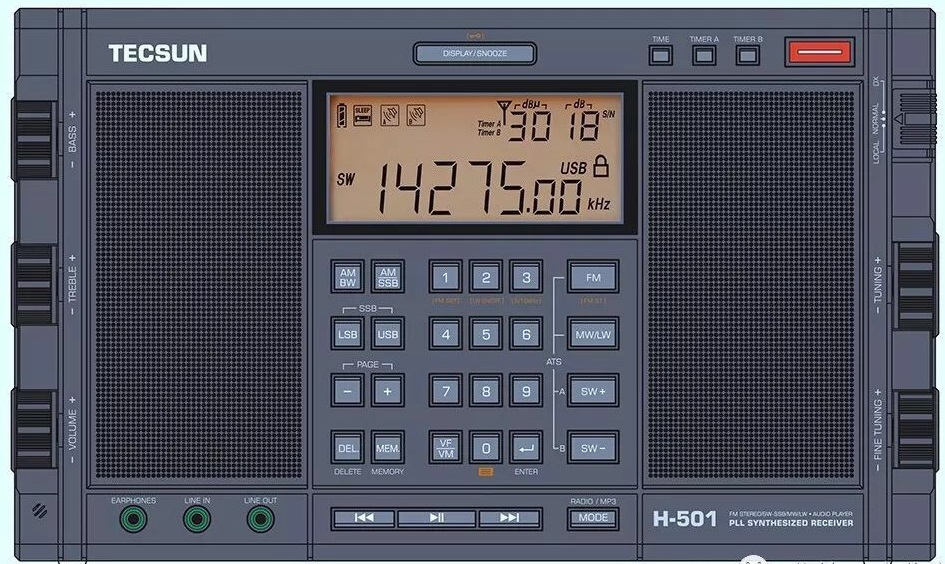
View of the western cluster of curtain antennas from the roof of RCI Sackville’s former transmissions building. Photo from June, 2012.
Radio Waves: Stories Making Waves in the World of Radio
Because I keep my ear to the waves, as well as receive many tips from others who do the same, I find myself privy to radio-related stories that might interest SWLing Post readers. To that end: Welcome to the SWLing Post’s Radio Waves, a collection of links to interesting stories making waves in the world of radio. Enjoy!
Many thanks to SWLing Post contributors Kris Partridge, Gareth Buxton, Dave Zantow, and Paul R for the following tips:
Officials at CBC/Radio-Canada announced a fresh round of cuts at Radio Canada International (RCI) on Thursday as part of a “major transformation” of the beleaguered international service of Canada’s public broadcaster.
A joint statement released by Radio-Canada executive vice-president Michel Bissonnette and his CBC counterpart, Barbara Williams, said the goal of the transformation was “to ensure that the service remains a strong and relevant voice in the 21st-century media landscape.”
“In its strategic plan Your Stories, Taken to Heart, the public broadcaster committed to ‘taking Canada to the world’ and ‘reflecting contemporary Canada,’” the joint statement said.
“Transforming RCI is a necessary step to allow the service to effectively fulfil the important role it must play in delivering on those commitments.
“To that end, RCI will soon be offering more content in more languages, drawing on the work of CBC/Radio-Canada’s respected news teams to reach new audiences at home and abroad.”
Earlier in the morning Radio-Canada executives held a virtual meeting with RCI employees to inform them of upcoming changes.
In all, the transformation will reduce the number of RCI employees by more than half, from the current 20 to nine, including five journalists assigned to translate and adapt CBC and Radio-Canada articles, three field reporters, and one chief editor.
As part of the announced transformation, the English and French language services of RCI will be eliminated and will be replaced by curated content created by CBC and Radio-Canada respectively.
The remaining Arabic, Chinese and Spanish services will also be reduced in size.
However, two new language services – Punjabi and Tagalog – will be added to the editorial offering presented by RCI, officials said.
RCI content will also get more visibility by being incorporated into CBCNews.ca and Radio-Canada.ca with its own portal page featuring all the languages, the statement said.
RCI apps will be folded into the CBC News and Radio-Canada Info mobile apps, while the service’s five existing apps will be deleted, the statement added.
Under the new plan, RCI’s operations will focus on three main areas: translating and adapting a curated selection of articles from CBCNews.ca and Radio-Canada.ca sites; producing a new weekly podcast in each RCI language; and producing reports from the field in Chinese, Arabic and Punjabi.
“This transformation will help bring RCI’s high-quality, relevant content to more people around the globe and allow them to discover our country’s rich culture and diversity,” the statement said.
The union representing Radio-Canada employees lambasted the move as a “rampage.”
“It feels like Groundhog Day with more cuts to RCI under the guise of transformation,” said Pierre Toussignant, president of Syndicat des communications de Radio-Canada (SCRC).
In 2012, CBC/Radio-Canada slashed RCI’s budget by nearly 80 per cent, forcing it to abandon shortwave radio broadcasting altogether. The cuts also resulted in significant layoffs and the closure of RCI’s Russian, Ukrainian and Portuguese language services.[…]
On December 3, 2020, Canada’s national public radio and television broadcaster CBC/Radio-Canada announced “a major transformation” of Radio Canada International (RCI) titled “Modernizing Radio Canada International for the 21st century”. And if you didn’t know anything about the toxic relationship between the two, you would really think this was great news.
After all the budget cuts the national broadcaster has imposed on RCI (for example an 80 % cut in 2012) the news this time is more languages, greater visibility, and an expanded editorial line-up.
Let’s take these “improvements” one at a time.
How has CBC/Radio-Canada decided to give “greater visibility” for RCI’s Internet content? They’re going to bury it in inside the CBC and Radio-Canada websites, and not allow RCI to continue on a site that has existed since 1996.
In this same announcement, CBC/Radio-Canada says it’s adding complete sections in Punjabi and Tagalog to the existing services in English, French, Spanish, Arabic and Chinese. In fact it’s adding one “field” journalist to work in Punjabi, and one in Tagalog – not whole sections.
As far as the Spanish, Arabic and Chinese services which each have three seasoned experienced presenter-producers offering tailored content for their target audiences outside Canada, well, they’re all fired. What will remain is one “journalist” per language, who will be obliged to translate texts given to them in English and French.
And now we come to the sections working in Canada’s official languages of English and French. Again, each of these services has three seasoned experienced presenter-producers offering tailored content for an international audience that needs explanations that the domestic service is not obliged to do. So what will Canada’s Voice to the World be obliged to do in this “major transformation”? Fire all six producers and have an editor at CBC, and one at Radio-Canada, choose some stories, and place it on the “RCI website” which is just a section of the CBC and Radio-Canada websites. Yes, the ones that give RCI “greater visibility”.
The CBC/Radio-Canada announcement speaks glowingly about how RCI has provided a Canadian perspective on world affairs, but then starts skidding into talking about “connecting with newcomers to our country”, “engaging with its target audience, particularly newcomers to Canada”, and making this new content “freely available to interested ethnic community media.” Certainly sounds like CBC/Radio-Canada is intent on servicing ethnic communities in Canada.
But there’s a problem. That’s not RCI’s mandate. And CBC/Radio-Canada has no right to change that mandate. Because Canada’s Broadcasting Act, Article 46 (2), makes it a condition of the national public broadcaster’s licence to provide an international service “in accordance with such directions as the Governor in Council may issue.”
And the latest Governor in Council, Order in Council, PC Number:2012-0775, says Radio Canada International must “produce and distribute programming targeted at international audiences to increase awareness of Canada, its values and its social, economic and cultural activities”.
This latest announcement by the CBC/Radio-Canada is, unfortunately, yet another in a string of actions over the last 30 years to eliminate Canada’s Voice to the World.
After failing to shutdown the service in 1990, 1995 and 1996 when pressure from listeners from around the world, and from Canadian Members of Parliament and Senators stopped the closure, the national broadcaster went about dismantling RCI one section after another, one resource after another in a death by a thousand cuts.
This assault on RCI really started in earnest in 1990 when Canada’s Voice to the World was a widely popular and respected international service of 200 employees, broadcasting in 14 languages heard around the world. The 1990 cut removed half the employees, and half the language sections. Over the years, under the guise of streamlining and improving the service, it’s been one cut after another. With this year’s announcement RCI will have a total of nine employees!
Not satisfied with cutting resources, CBC/Radio-Canada has also continually tried to undermine RCI’s international role.
When in 2003 a Canadian parliamentary committee agreed with the RCI Action Committee, in emphasizing RCI’s important international role and suggested more resources should be given to RCI, CBC/Radio-Canada responded by removing two key corporate policies that specifically outlined the necessity for producing programmes for an international audience, again, despite an obligation under the Broadcasting Act.
The reductions in resources, the limiting or decreasing of RCI’s outreach, culminated in 2012 when CBC/Radio-Canada announced it was taking RCI off of shortwave radio broadcasts which had been the main way of communicating to the world since 1945.
This decision deliberately ignored the 2003 Order in Council that specifically obliged CBC as part of its licence to have RCI broadcast on shortwave. Two months after protests by the RCI Action Committee highlighted the illegality of this move, the Canadian Heritage Minister at the time, changed the Order in Council, eliminating shortwave from RCI’s obligations.
This whole sorry tale underlines a key problem facing Radio Canada International:
A domestic national broadcaster is deciding whether or not Canada should have an international voice to the world, and how well it should be funded.
Clearly however, the decision of whether Canada has a Voice to the World and how well it should be funded, should be a decision made by Parliament.
In the meantime, Canadian Heritage Minister Steven Guilbeault should tell CBC/Radio-Canada that it is not allowed to make this latest policy change. Then he should freeze any changes to the service until there is a serious renewal of the Voice of Canada, one that will give it financial and political protection from a toxic relationship with the national broadcaster.[…]
Radio Disney and Radio Disney Country are shutting down early next year.
Disney Branded Television president Gary Marsh announced the news Thursday, which impacts 36 part-time and full-time employees. The move comes as Marsh’s division looks to emphasize the production of kids and family content for streaming service Disney Plus and the linear Disney Channels.
Radio Disney first debuted in Nov. 1996 as a terrestrial broadcast network, aimed at kids, who would pick music playlist by calling a toll-free phone request line. The station was key to amplifying a bevy of musical artists, including the Jonas Brothers, Miley Cyrus, Selena Gomez, Demi Lovato, Hilary Duff, Aaron Carter and others.
Radio Disney Country launched in 2015 as a digital platform, expanding two years later with two Los Angeles terrestrial stations.[…]
Germany is to revamp its phonetic alphabet to remove words added by the Nazis.
Before the Nazi dictatorship some Jewish names were used in the phonetic alphabet – such as “D for David”, “N for Nathan” and “Z for Zacharias”.
But the Nazis replaced these with Dora, North Pole and Zeppelin, and their use has since continued with most Germans unaware of their anti-Semitic origin.
Experts are working on new terms, to be put to the public and adopted in 2022.
The initiative sprang from Michael Blume, in charge of fighting anti-Semitism in the state of Baden-Württemberg, backed by the Central Council of Jews in Germany.
The job of devising new terms for the problematic letters is now in the hands of the German Institute for Standardization (DIN).
The commonly-used equivalent in the UK is the Nato phonetic alphabet, with terms such as “F for Foxtrot, T for Tango”. But many English speakers also use terms like “D for Dennis, S for Sugar” on the phone.[…]
Click here for the Newsroom audio via BBC Sounds.
Is FM radio more energy-efficient than DAB? Do transmitters or audio devices consume the most electricity? What effect will switching off certain radio platforms have on energy use? As part of our work to improve the environmental impact of BBC services, we now have the answers to these questions and more.
Today, we are publishing our research which explores the energy footprint of BBC radio services, both as it stands now and how it may change in the future. This work is the first of its kind in analysing the novel area of radio energy use and forms an extension to the research we released back in September looking at the environmental impact of BBC television.
In our study, we considered the energy use across all available platforms, namely AM, FM, DAB, digital television (DTV) and via internet streaming services (such as BBC Sounds), revealing which ones have the largest footprints. We also compared energy use at various stages in the radio chain – not just looking at what the BBC is directly responsible for, such as preparation (playout, encoding and multiplexing) and distribution (transmitters and internet networks), but also in the consumption of our content by audiences. This highlighted the key energy hotspots in the BBC radio system and where best to focus our efforts if we want to reduce our energy footprint.[…]
Do you enjoy the SWLing Post?
Please consider supporting us via Patreon or our Coffee Fund!
Your support makes articles like this one possible. Thank you!

 Many thanks to SWLing Post contributor, Gareth Buxton, who writes:
Many thanks to SWLing Post contributor, Gareth Buxton, who writes:




